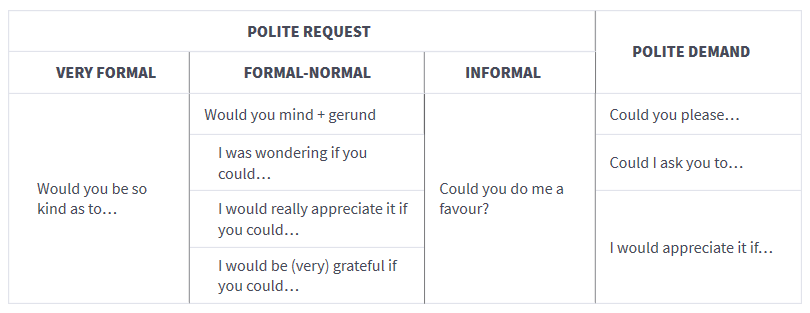All of us in our work are often faced with the need to turn to someone for help. In English, the difference between a polite request and a request to do something can be difficult to grasp, because there are well-established rules based on customs and generally accepted norms rather than logic. However, it is very important to feel this difference. By mishandling, we can not only fail to achieve the desired result, but also offend the interlocutor. As you probably already know, in English, unlike many others, simply adding "please" is not enough. Our colleague, Scott Boyce, EPAM Language Trainer, looked at several ways to write queries in English and looked at common mistakes.
The article will be especially useful for those who often have to communicate in English at work.
How to politely ask someone to do something
Mind
'To mind' in the context of requests means to object / have something against. Orally, this phrase can be used to make a demand rather than a request, depending on intonation and context. However, in writing, this is usually considered a request, for example:
Would you mind sending that before the end of the day?
Note that mind is followed by a gerund. We cannot use the infinitive, i.e. you can't say:
Would you mind to send <…>?
To make this request even more polite, you can put a suitable adverb after the word ' mind' :
Would you mind terribly sending that before the end of the day?
, , , ‘no’, ‘yes’― , :
No, I don’t mind doing that at all.
Favour
:
Could you do me a (big) favour? Can you send me that before the end of the day?
, ‘do’, ‘make’. ( , ‘favour’ ‘u’ ― ‘favor’).
, . — , . - , , , , , .
Wonder
:
I was wondering if you could send me that before the end of the day.
, — ‘was wondering’ ‘could’. «» ‘mind’, ‘favour’ ‘wonder’, :
I was wondering if you would mind doing me a huge favour.
Appreciate
:
I would really appreciate it if you could send it to me before the end of the day.
, ‘it’. ‘appreciate’ ! - .
‘really’ ‘very’. , ‘very’ (. . — , , much: I would very much appreciate it …).
, ‘really’, , :
I would appreciate it if you could send it to me before the end of the day.
Grateful
‘Grateful’ ‘appreciate’. , ‘grateful’ — , (no ‘it’!):
I’d be really grateful if you could send it to me before the end of the day.
(‘grateful’ — ), ‘really’ ‘very’.
‘appreciate’, ‘really’/’very’ — .
Kind
, ‘Would you be so kind<…>’ , EPAM. , . :
Would you be so kind AS to send that to me before the end of the day?
, ‘as’, "so... as...".
, « » ( ). , , , . , ; :
“No, 'tis not so deep as a well, nor so wide as a church door, but 'tis enough.”
21 ‘so’ (, , ) ‘as’. , :
“No, it’s not as deep as a well, nor as wide as a church door, but it’s enough.”
“Would you be so kind as to <…>” — . , , . , - - ( ), .
- (Telling someone to do something)
, ‘could’. , :
Could you please send that to me before the end of the day?
, , — , , — , , . .
, ‘please’, ‘ask’:
Could I ask you to send that to me before the end of the day?
, , , :

, !
:
“Go wisely and slowly. Those who rush stumble and fall.” .. « . , , ». , : « ― ».